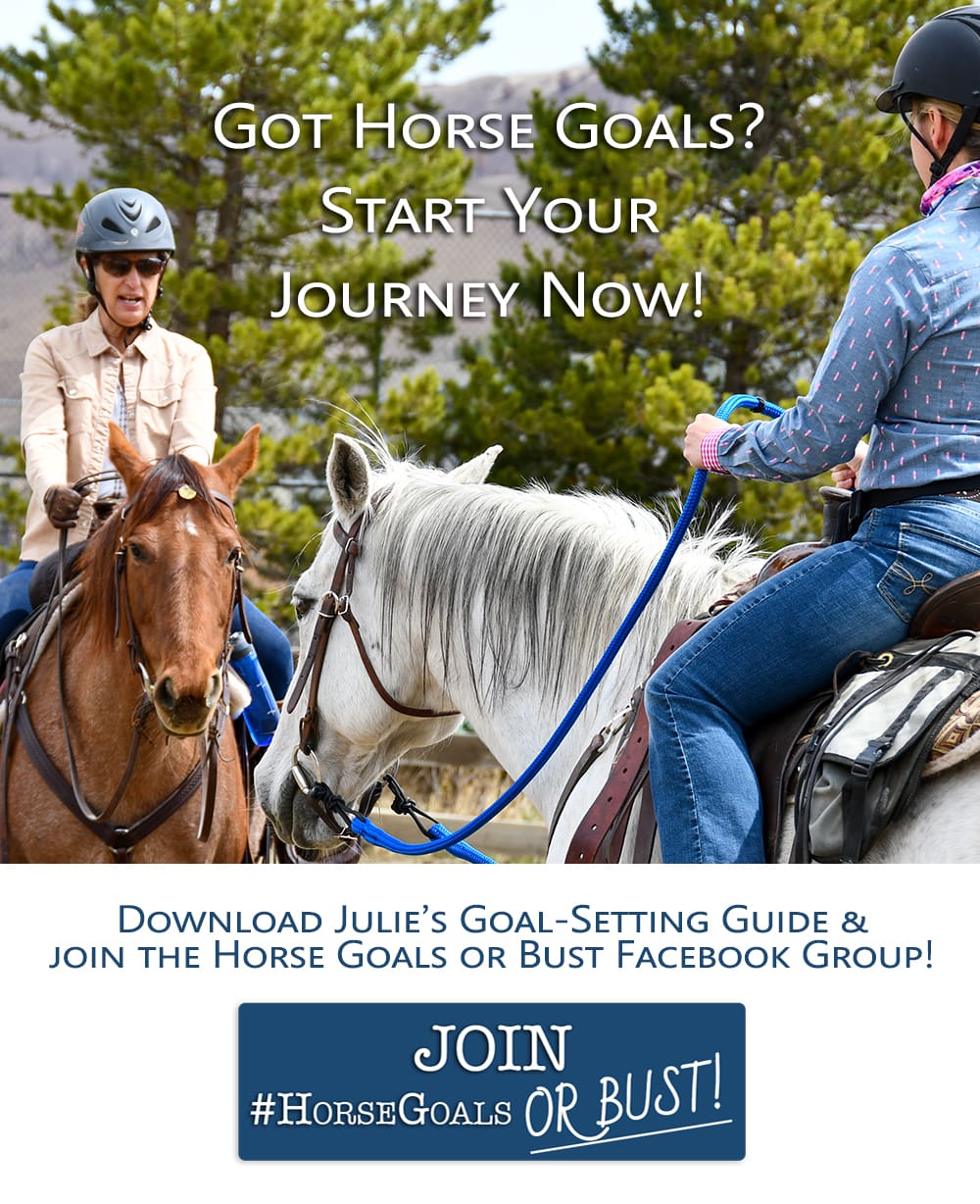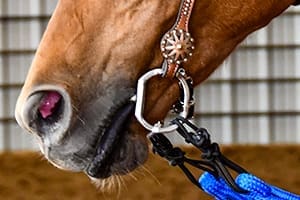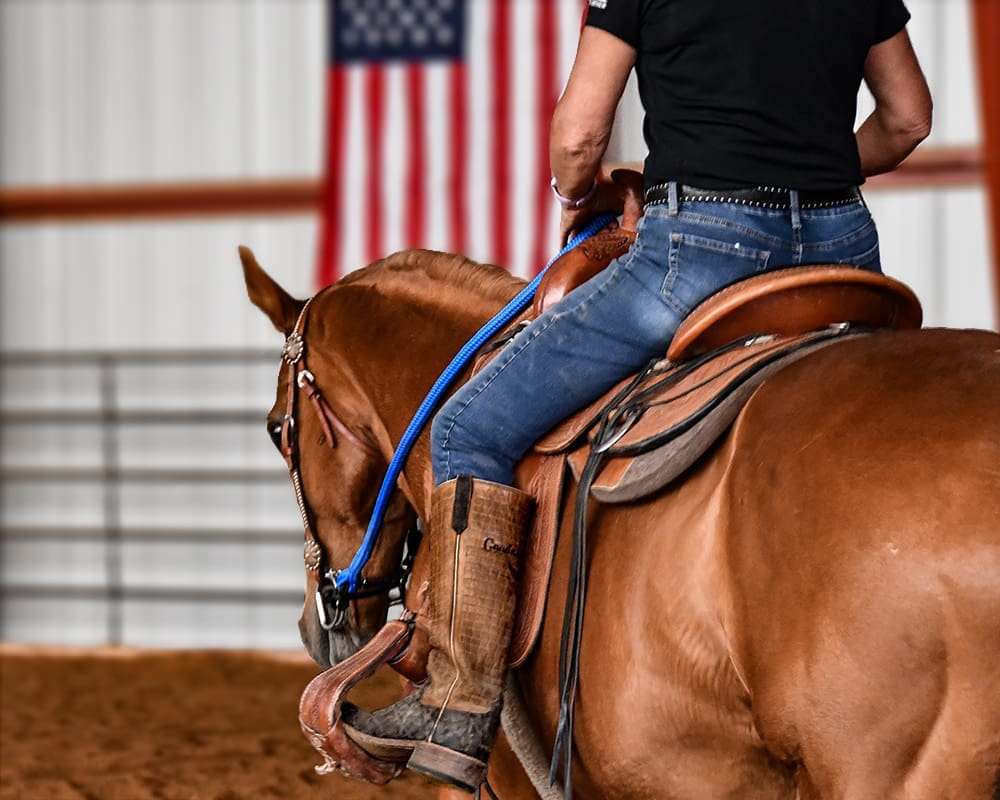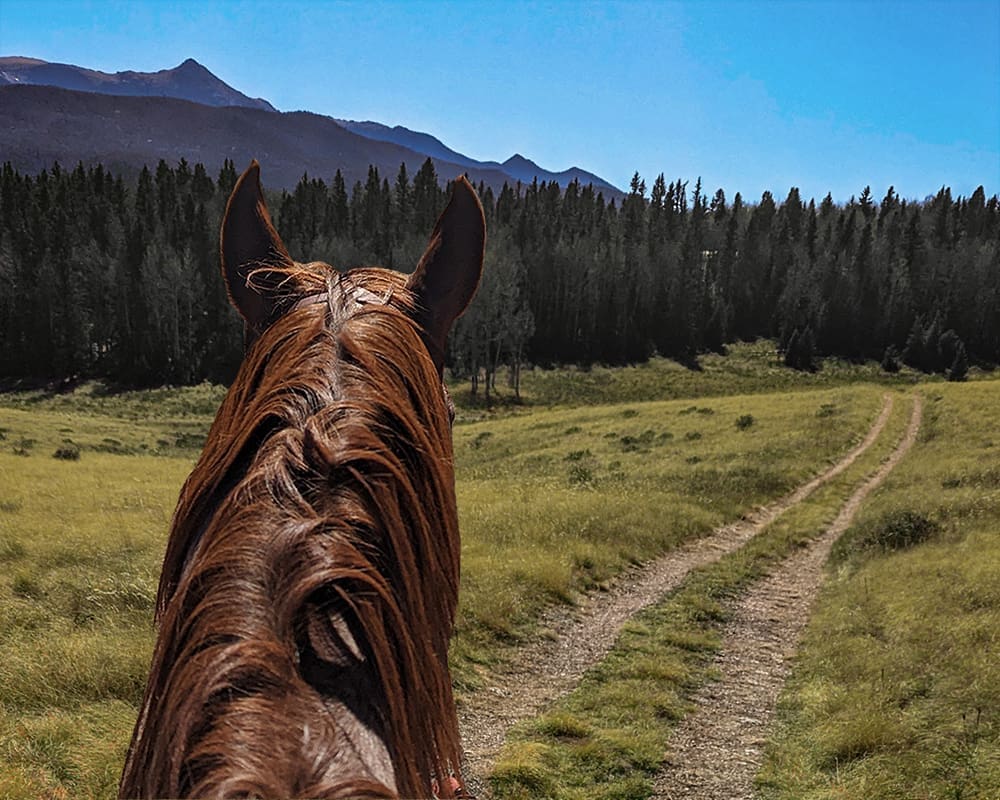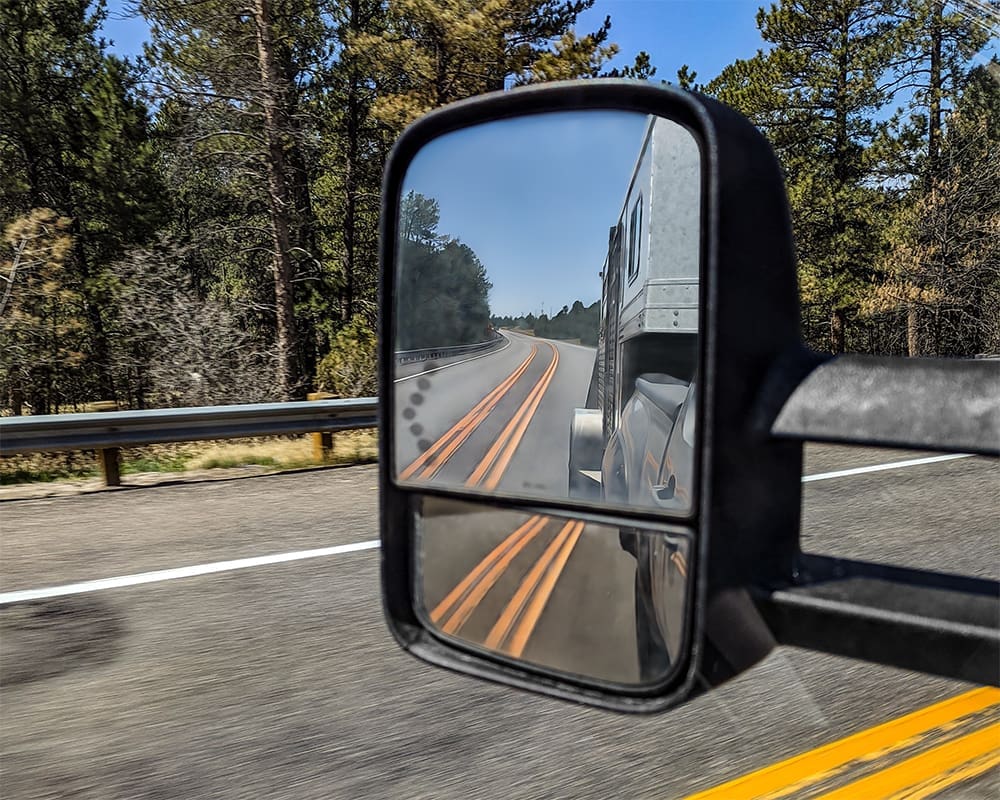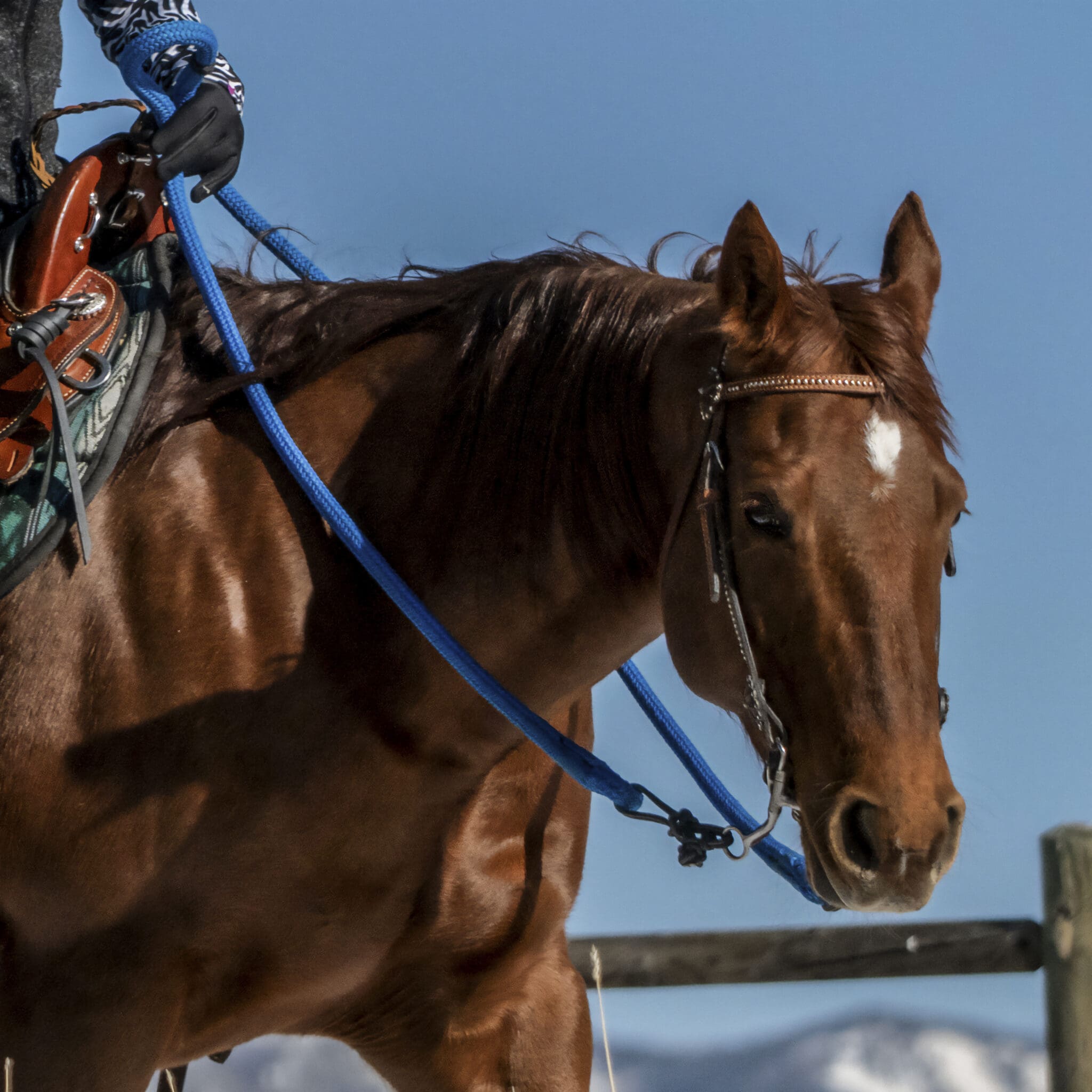
If you’ve ever ridden with me in a clinic, you’ve heard me talk about how clever horses are at determining a person’s level of intention and determination, or lack thereof. Although it is a super power of horses, it’s not mystical or magical. Knowingly or unknowingly, you are always communicating something about yourself to the horse. In the end, they are simply deciphering the clues you constantly present.
Specializing in self-preservation, horses constantly assessing everything around them—including you—asking themselves, ”What is going to happen to me next?” or, “How is this situation going to impact my life?” Horses crave security and comfort and you, as handler or rider, have the capacity to affect that—for better or worse.
Given that horses have keen situational awareness and are lightning-fast learners who communicate primarily with gestures and postures, they easily learn to “read” humans and spot the easy marks. They see your confidence level, your determination, your intention—or lack thereof. Horses are quite discerning in their analysis of situations, including the humans that impact their lives.
Horses can behave vastly differently for different riders or handlers. A horse’s awareness of its environment allows him to effectively analyze people—much like a used car salesman scopes out a potential customer perusing the cars on his lot. Indeed, when approaching a new relationship with a horse, the human tends to be starry-eyed and smitten, causing them to overlook or excuse many small transgressions the horse makes—moving into your space, breaking gait, cutting corners, inching toward the arena gate. The horse, on the other hand, is busy analyzing and calculating to figure out what kind of deal he can strike and how good it will be for him.
You are entering into a contract of sorts when you establish a relationship with a horse, and he sees where he can push to get as much out of the deal as he can for himself. Strong relationships are forged over time as you get to know each other, trust each other and become comfortable together. When it comes to business, once a deal is struck, we get it in writing. This clarity makes for better business relationships. And if you can look at your relationship with your horse a little more from this perspective, and less like a romance novel, it might help your horsemanship too.
Perhaps we, as humans, should think more like a discerning car buyer when approaching a new relationship with a horse. Don’t present yourself as naïve, gullible, with bottomless pockets. Instead, think about negotiating a mutually beneficial agreement between the two parties, with conditions clearly stated, addressing conflicts of interest that arise, and establishing penalties for any breaches of contract.

Negotiate the Deal
To the horse, your first few encounters are the most enlightening. He’s looking for clarity, consistency, fairness— and if he can check all these boxes, it will lead to a high level of trust. He’s also probing to find your boundaries and determine how much he stands to profit off any potential deal. This is not the time to appear to be gaga over the horse or indicate that you have deep pockets (full of treats).
During this time, the horse is analyzing your emotionality, your confidence level (body language), your authority, your boundaries, and most of all—your leadership potential. He’s seeking a calm and benevolent authority to partner with, who is emotionally stable, gives clear directives, rewards effort, and makes him feel safe. But he’s not opposed to taking advantage of a naïve partner either, particularly if it means getting out of certain unpleasant tasks like loping circles or getting his feet wet crossing the creek. He’ll need answers to these important questions: will he always have to do what’s asked and is his compliance negotiable?
For my part, my first few encounters with any horse are more business-like than friendly. I am polite, but I am abundantly clear on my boundaries as we get to know each other. I am also very clear on my expectations of the horse, and mindful about setting a precedence—particularly in matters that relate to safety and self-control.
Once we decide to do business together, it’s time for the buyer to kick the tires and check under the hood while the salesman runs a credit check to see how deep your pockets go. Remember, both parties are out to get the best deal for themselves.
During his due diligence, the horse is probing and testing my boundaries—assessing my willingness to reinforce my directives. Testing by the horse of the human can come in many forms, both subtle and overt. From slight changes of speed to slamming on the brakes at the gate, from cutting corners, to pretending it has no clue what the go cues are, to walking over the top of you.
As the new handler/rider, my due diligence is to assess the horse’s willingness, his understanding of cues, and his compliance and sensitivity levels. It’s very important that the horse learns that I will ask politely and lightly only once, then reinforce my cues with immediacy and with adequate pressure to motivate change. The funny thing is, once the horse understands that about me, there will be few challenges to my authority, and reinforcement will rarely be required. I also need the horse to understand that I will always be fair, and I will always recognize and reward his effort with a complete release of pressure, rest, and praise.
Terms of the Contract
Terms should always be stated up front, with clarity and certainty. You’d hate to buy a car and find out later that the balance of the loan was due in six months, the interest rate was over 20%, and that you could only drive the car on Tuesdays and Thursdays.
The horse wants to know what decisions he can make, what he is allowed to do or not do, and if his compliance is optional. When riding, can he slow down or speed up when he wants, can he veto directives or make decisions about the path he travels?
For my part, I want to keep it clear and simple for the horse. I decide where we go and how fast we get there, and that these things are not up to him. I also pledge and demonstrate that I am a capable leader, I make thoughtful decisions, I will keep my horse safe and comfortable, and never ask him for more than he is capable of giving me.
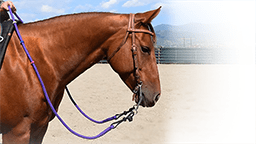
Conflicts of Interest
In any business relationship between two parties, there will be times when your interests differ. It’s how we deal with conflict that makes our relationships stronger or weaker—your mutual trust grows, or is shattered. As much as I’d like to think I will never make a mistake with my horse, I know I will. And as much as I’d like to believe my horse is perfectly obedient and will never disagree with me, I know he’s actually a horse—not a robot. He won’t always be perfect, and by nature will always act in his own self-interest.
Horses can have a strong sense of right and wrong, and what is (or isn’t) fair. When called out for misbehavior, they may resist or shake their heads a little, but when expectations are clear—and reinforcement of these expectations is consistent and fair—cooperation soon follows.
However, if the horse pays a penalty for a rider’s mistakes, all bets are off. For example, if a rider cues the horse to canter, and then pulls on the reins when he does (even unknowingly), he gets slammed in the mouth with the bit. When this happens, the horse is being punished for doing what was asked of him, and he may justly consider this unfair and lose trust in you. It’s a serious breach of contract.
For my part, I pledge to my horse that I will always own my mistakes as soon as I realize I’ve made one—and learn from it so I don’t make that mistake again. Realizing and understanding the mistake in the first place is the hard part. You have to know you are making a mistake before you can own it. I know that riding and handling horses is complicated, and it’s easy to miscommunicate, get out of balance, or caught off-guard. So even though I know mistakes will be made, I need my horse to know that I will always require his cooperation and that I will consistently reinforce the expectations I have set.
Sealing the Deal
Structuring a deal that everyone is happy with is not as hard as you might think. Fortunately for us, horses are willing and capable partners. They thrive and flourish when faced with structure, consistency, and strong leadership, but without these things, they don’t always do well or make decisions we agree with.
We can drive a hard bargain to get everything we want—a horse that is willing, compliant, and gives us their best effort when asked. To get a cherry deal like that, you must be aware of and have control over your body language and emotionality. You must have clear communication, consistent reinforcement, offer fair compensation, and have accountability for your own actions. It’s a high bar to set, but the rewards are big too!

